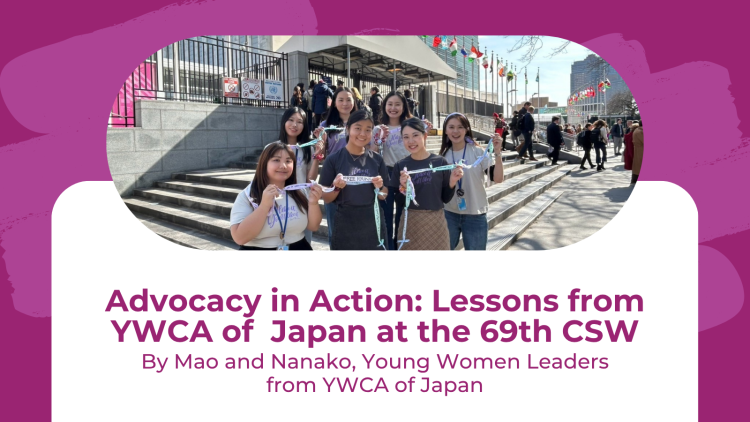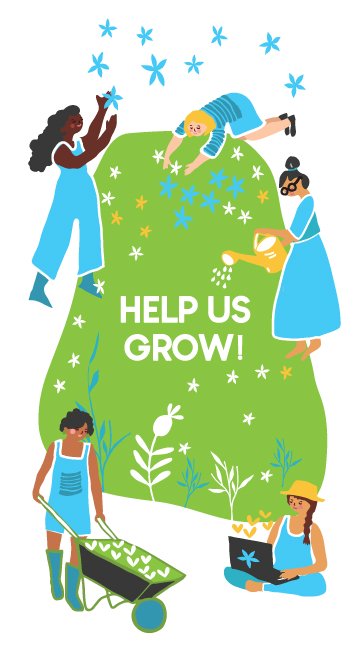‘Advocacy’ is a word often used in our work, but why is it important, and what do we need to know to do it effectively? Mao and Nanako, young women leaders from the YWCA of Japan, share their thoughts, reflecting on their experiences at the 69th Commission on the Status of Women (CSW).
Why YWCAs in Japan Cannot Stay Silent by Mao
My name is Mao, and I am from the Tokyo YWCA. I was one of the youth delegates sent by YWCA of Japan to speak at a parallel event titled “Under Threat: Life Near the U.S. Military Bases in Japan.” At the YWCA of Tokyo, I work on advocacy related to U.S. military base issues in Japan, with a focus on Okinawa.
As a public interest foundation, YWCA of Tokyo organizes events to help people understand the reality of Okinawa, which hosts about 70% of the U.S. military bases in Japan. Did you know that some of these bases are in the middle of residential areas, and one has even been called “the most dangerous base in the world”?
Communities suffer from serious problems: environmental pollution, including PFAS contamination stemming from the bases; ongoing construction of new bases despite local opposition; and sexual violence against women. In June 2024, it was revealed that a sexual assault by U.S. military personnel against a minor had gone unreported to Okinawa authorities for over six months. From the standpoint of protecting women, children, and all those affected by military presence, the YWCA of Japan has raised its voice. That’s what led to this panel at CSW69.
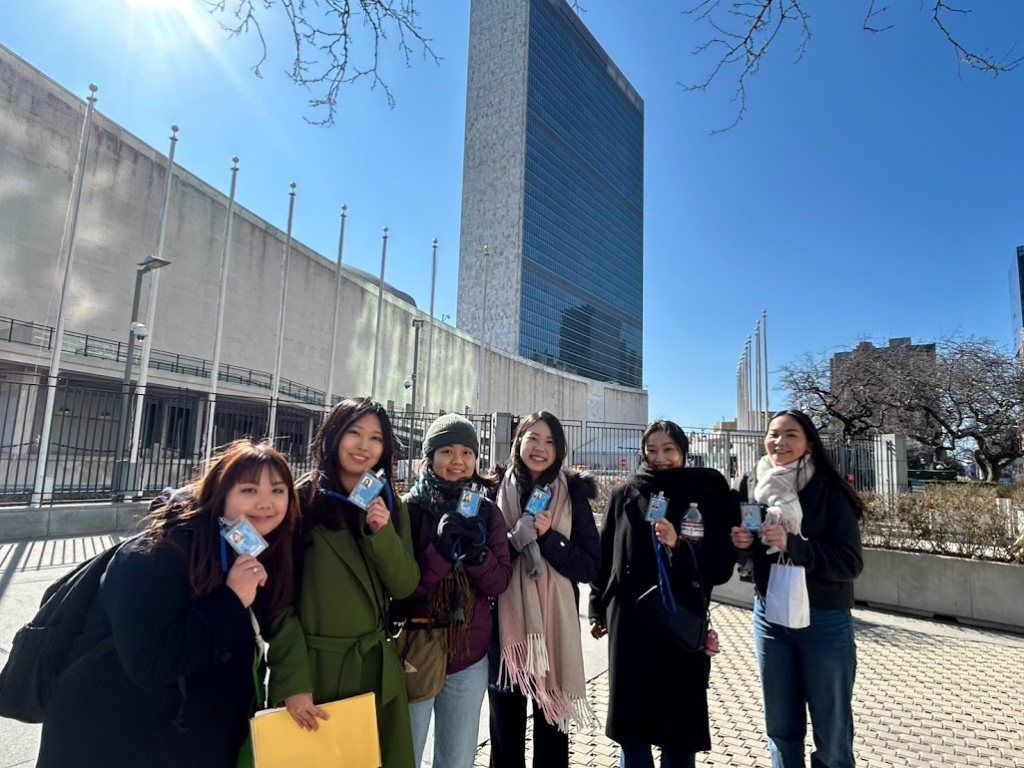
I first became interested in U.S. military base issues while I was a university student. Later, in graduate school, I researched environmental contamination caused by the bases. With the belief that “I have a message to share because I’ve studied this issue in Japan,” I went to CSW determined to speak up. In New York, I rehearsed with my fellow delegates and felt fully prepared. However, at the moment I sat down for the panel, I looked around and thought, “Here is America.” I felt a wave of indescribable tension. I was about to talk about U.S. military violence—right in the U.S.
I was nervous about how the audience would respond. But when I called for the revision or even termination of the Japan-U.S. Status of Forces Agreement (SOFA), I received applause. That gave me courage and confirmed that my message had reached them. At the same time, I thought, “When would I have another chance to speak up like this?”
Through CSW, I realized the power of having a space to raise our voices in the international community. It gives us motivation and a sense of purpose to take action on social issues.
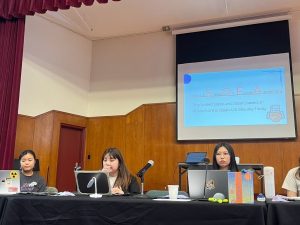
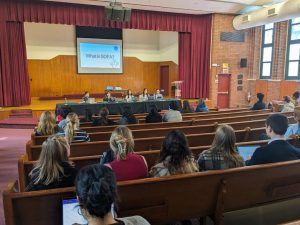
I now believe more strongly than ever that we must continue to create these spaces, where different generations can speak out and take action together. For me, YWCA is where my leadership journey begins. To fulfill its mission of empowerment, I believe that one of the most powerful things we can do is to demonstrate our own empowerment through learning, speaking out, and taking action.
In Japan, June 23 is Okinawa Memorial Day—a day to mourn all lives lost in the Battle of Okinawa during World War II and pray for peace. Building on our experiences at the UN, our CSW69 team will host a public event in Japan focused on advocacy around U.S. military bases. By continually creating opportunities to raise our voices through YWCA and by collaborating with YWCA leaders across generations, I will continue to explore my own leadership journey.
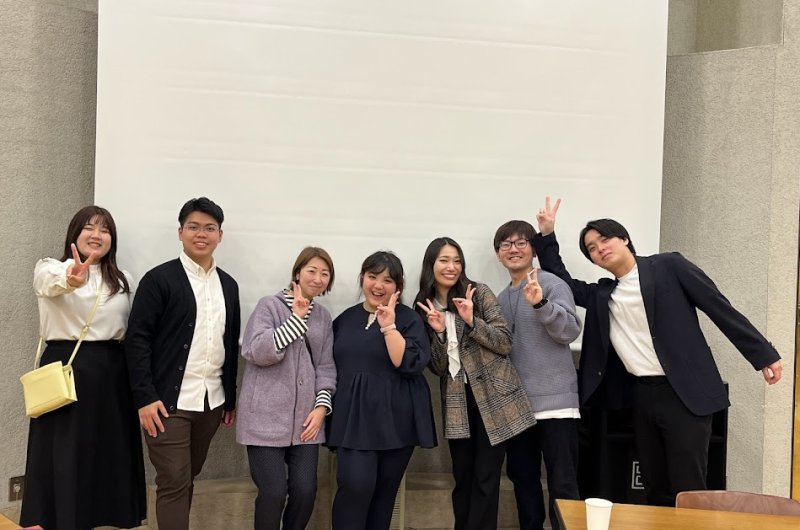
What Advocates Need to Know by Nanako
Throughout the 69th CSW, I deeply considered whether the current advocacy work would surely lead to transformative changes that dismantle uneven power structures. One striking fact in organising our parallel event was that the authorities have ignored the voices of people in Okinawa despite their continuous protests. It is an abuse of power. We are speaking up, but our voices are not heard. We, advocates, need to dismantle the power and systemic marginalisation.
I also deeply thought about whose voices were at the center of advocacy works for minoritised populations. When I attended a parallel event hosted by the National YWCA of Korea, I realized the importance of centering young women’s stories in projects designed for them. Without their voices, advocacy works reinforce discrimination and exclude diverse perspectives. As a leading member of Rise Up! Leadership Workshops for school students in Japan, I will further incorporate students’ voices into the programming of our Rise Up! Leadership Workshops.
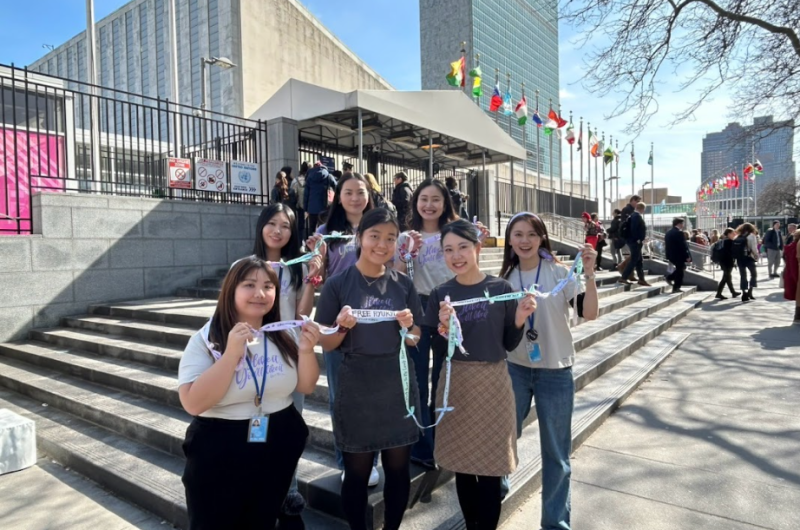
CSW is a global-level platform to advocate for the minoritised groups. Attending CSW is a very privileged opportunity. The goal of joining it should not be for their satisfaction or to enhance one’s CV. It is for delivering unheard voices to global decision-making tables. It is our responsibility to leverage the opportunity to transform society. Just like Mao, I am determined to remain committed to transformative changes that will realize an equitable, just, and peaceful world.
Bios
Mao Kuniyoshi is a staff member at the YWCA of Tokyo who believes in building peace by protecting human rights, health, and the environment. Her interest in U.S. military base issues began during her university studies in international relations. In graduate school, she focused her research on the Japan-U.S. Status of Forces Agreement (SOFA) and environmental pollution stemming from U.S. military bases in Okinawa. Through her advocacy, she aims to shed light on the human rights impacts of military presence in Japan and the structural issues embedded in the SOFA.
Nanako is a passionate youth advocate who envisions a society where everyone can make their own decisions for their lives. She leads the Rise Up! Leadership Workshop at Kyoto YWCA and inspires 300+ school students to showcase their authentic leadership. Believing in the transformative power of storytelling, she has been amplifying the voices of young people locally, nationally, and globally.

